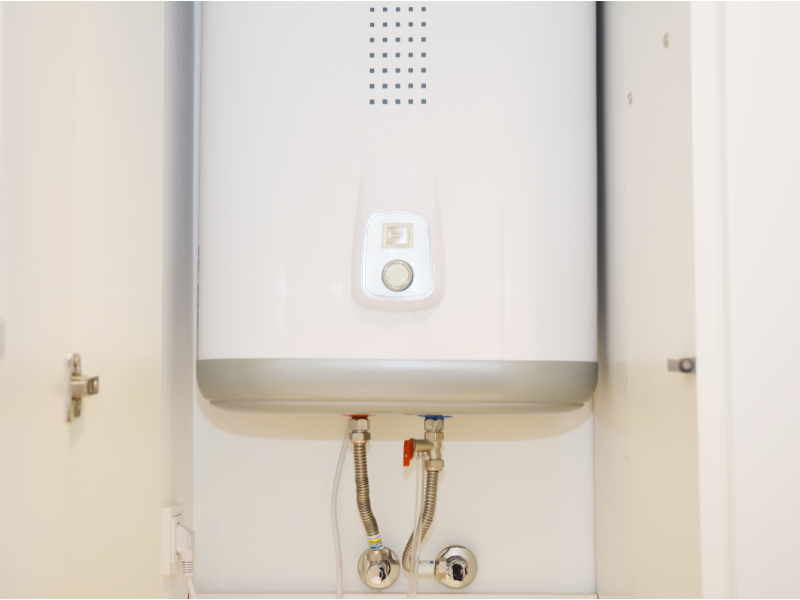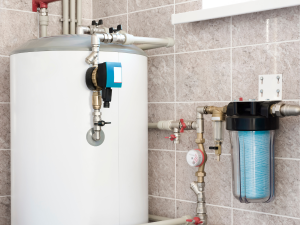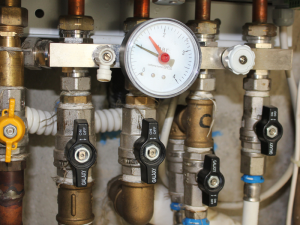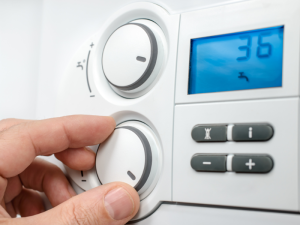With winter quickly approaching, many home and business owners are beginning to turn on their heating systems to combat the incoming colder weather.
If your heater is getting old or outdated, it may be time to think about replacing your current unit with a newer one before it starts to completely fail.
One of the many possible options for both home and business owners are boilers. However, this leads to the question, “what kind of boiler should you invest in: a condensing or non-condensing boiler?”.
If you’re having a hard time deciding between a condensing vs non-condensing boiler, you’re far from alone.
Each type has their own pros and cons, which can make it difficult for home and business owners to make the right choice.
To help you choose between a condensing boiler vs a non condensing boiler, our team at Clover Contracting has put together a list of facts (as well as the key pros and cons) of each option.
What’s the difference between condensing and non-condensing boilers?
Here’s a quick overview of the different aspects of condensing and non-condensing boiler units:
What are non-condensing boilers?
If you have seen a boiler or have gotten the chance to see what they do, a non-condensing boiler works in much of the same ways.
When natural gas – a boiler’s most common fuel source – is burned, CO2 and water is created as a by-product. That heat is then transferred up through the boiler’s heat exchangers. At the same time, cool air is pulled into the chamber where the heat is transferred from the heat exchangers to the air before the now-warm air is pushed out and through to the rooms that need it.
In non-condensing boilers, gas is often used to heat the water and any excess gas and the cooled down steam is released outside the home. This often comes out as white colored smoke or emissions.
What are condensing boilers?
Condensing boilers are quite similar to their non-condensing counterparts. Both types of boilers use gas to heat the air that’s brought in, but the detail that separates a condensing vs non-condensing boiler is their exhaust.
Condensing boilers are known to take the extra water vapor and gas from the first heat exchanger chamber and bring it into a second one to be used again. That second exchanger chamber allows the emissions that do finally come out to be clear or invisible, instead of the white that non-condensing boilers release.
Condensing boilers pros and cons — What should buyers be aware of?
Some of the pros and cons of condensing boilers that buyers should be aware of include:
Pro: Environmentally friendly
If you want to invest in a boiler for your home or business and want to take an eco-friendly approach to heating your building, a condensing boiler may be right for you. Many condensing models feature two separate heat exchanger chambers, with the larger of the two being used for recycling the waste gas and water.
Because of this, these kinds of boilers are much more environmentally friendly and are even said to have a smaller CO2 footprint.
Pro: Smaller in size
Due to how they’re made, condensing boilers don’t use a tank to store hot water like many non-condensing types do. This gives the boiler the ability to be smaller and sleeker.
Smaller boilers are easier to finstall in tight spaces, which creates space for additional HVAC systems and miscellaneous household items like old holiday decor and workout equipment.
Con: Extra plumbing and higher maintenance
One of the main downsides of condensing boilers is the amount of extra plumbing that’s needed. While the system itself is relatively small, a condensing boiler also needs an additional pipe or drain installed to get rid of any extra condensation that isn’t used.
While most is often reused, there still needs to be a way for excess to escape. In some cases, you might even need to get a specific type of pipe – or flue – installed to release the remaining gas. This additional piping can also lead to higher installation expenses.
Non-condensing boilers: Pros and cons
Some of the pros and cons of non-condensing boilers that buyers should be aware of include:
Pro: Longer lifespan
When it comes to the condensing vs non-condensing boiler debate, non-condensing models generally last much longer than other types of boiler units. While it is larger in size, these boilers often have fewer parts. Having fewer components reduces the risk of wear-and-tear-related issues, which can drastically increase the lifespan of the unit.
Pro: Lower initial cost
Another benefit of non-condensing boilers is the lower price point. If you’re looking into getting a traditional boiler, the final cost would fall between $1400 and $4000, depending on the size and type of fuel it uses. If you already have a non-condensing boiler, there’s no need for any additional parts to be installed. The same flue can be used for the new boiler.
Con: Less efficient
Due to its build and components, a non-condensing boiler isn’t as efficient as its counterpart. Its larger size can often mean that the boiler needs a larger amount of power to be used. However, since these boilers are also known for having rather hot exhaust and emissions, a good amount of the heat that’s created isn’t actually used to heat the home, which means that it goes to waste.
When compared to condensing types, non-condensing boilers are said to be roughly 15% to 20% less efficient.
Takeaway
Choosing the right type of boiler for your home or business is a big and difficult choice.
As a reminder, condensing boilers are often smaller and are a more environmentally friendly option. That being said, these units tend to cost a lot more to install in your home or business.
On the other hand, on-condensing boilers are less expensive and tend to last much longer; but are also less efficient when compared to condensing boiler units.
If you don’t have a tight budget and don’t mind any additional construction that might need to be done during installation, condensing boilers are the better choice. Otherwise, a non-condensing boiler can work just fine.




